
Grounded Preview and Interview with Senior Programmer Roby Atadero
In a manner that somewhat rhymes with the surprise announcement of The Outer Worlds at The Game Awards 2018 one year ago, Obsidian Entertainment took to a different stage this year to announce another new IP in Grounded, unveiled at X019 in London earlier today. Grounded is a bit of an unusual and unique undertaking for the studio, as it's both an early access title, the first project from the studio underneath the wings of Xbox Game Studios, as well as being a bit of a departure from the typical sort of RPGs we normally see from the genre veterans. As a cooperative survival game, it's fair to say that this isn't quite what anyone predicted would be Obsidian's first title to be fully published under Microsoft.
To get a better understanding of the core vision behind Grounded, we had the chance to go behind-the-scenes with the small team working on the game and have an extended chat with Senior Programmer Roby Atadero about the smaller project, working within a new genre, launching in early access, and more.
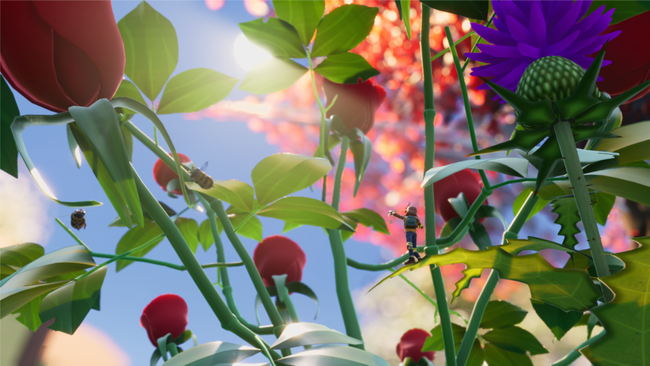
"We started this studio so long ago to make roleplaying games, that's what we do. But Grounded is going to be a little bit different from that." Obsidian boss Feargus Urquhart was not coy when introducing the surprising survival sim to us last month. Grounded started development soon after Obsidian stopped working on Armored Warfare in 2017, under a small team headed by Game Director Adam Brennecke, who has been with the studio since its inception in 2004. For what started as a small passion project for a group of about 13 developers to end up as a sort of surprise for Microsoft's X019 was something Adam never really expected. "It's a big departure from what you're used to seeing from Obsidian, but we wanted to make our own take on the survival genre while keeping what people expect from us as a studio."
Roby Atadero shared a similar sentiment when we had a chance to sit down as ask about the design decisions behind Grounded and Obsidian branching out to other genres. "A lot of us here at Obsidian have been playing survival games in recent years, and as a studio we're always looking to see where we can flex our creative muscles." Roby expressed a desire to make an approachable game that would be suited to players new to the genre while also maintaining the core survival mechanics that are inherent to it. "The idea of being shrunk down to the size of an ant was just a recurring one that captured the team's attention and ended up being a setting that was well suited for both of those core goals."
As for the Microsoft acquisition, Roby stated that the ambition for the game has not changed in the new publishing environment. "We're still making the game we want to make, that's what we're doing."
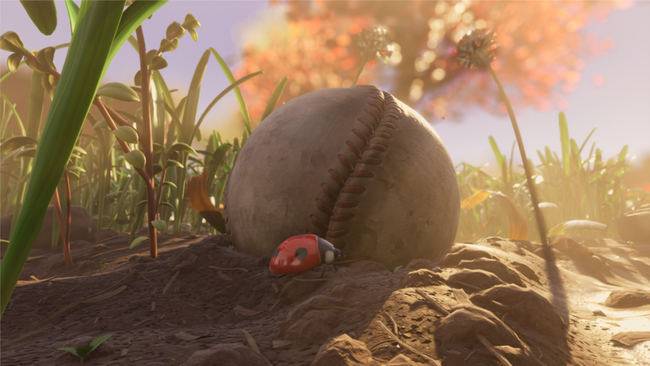
Grounded takes place in a familiar suburban backyard, where four players are shrunk down and must gather materials and craft supplies in order to survive against threats ranging from ants to spiders while also finding food, armor, and weapons. The demo gameplay did showcase some well-worn mechanisms such as resource gathering and thirst management, but exhibited a relaxed atmosphere at the same time, a result that can be attributed to both the setting and art direction.
"We want to tell a clear story, but the open nature of the game allows people to go at their own pace. In a more narrative-driven game, players only get meaningful experience if they push along that path. We want players to get an equally meaningful experience even if they decide to focus on exploring or crafting ahead of the story." A desire to blend the emergent storytelling of a systems-driven game with a predefined narrative more similar to a typical RPG seems to be the path Obsidian is set on following, though the demo gameplay shown to us focused a lot more on the systems at play while only hinting at the general premise of a wider story.
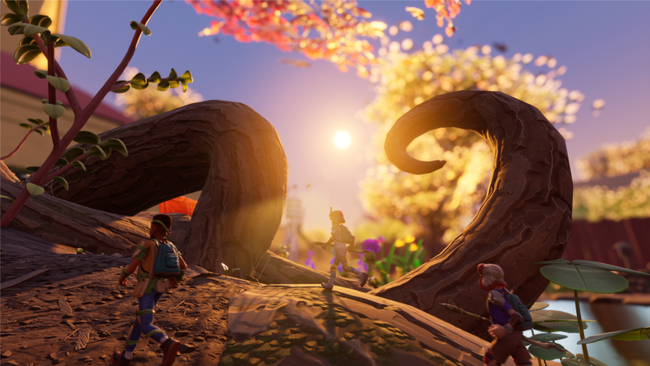
The insect ecosystem was described as a core system at the heart of the experience, with hundreds of creatures each behaving in different ways -- some such as ladybugs being passive and able to coexist with the players while others such as gnats act as pests. Each creature in the ecosystem is integrated in a way that responds to the players' actions. For instance, a group of players that hunts all of the aphids in a certain region might find that the ladybugs in the area will begin to migrate over time to a different region in response to their own food source being depleted.
"We want the creature AI behavior and environmental interactions to be unique and inherently fun to experiment with. We want there to be endless things to do and see how it all changes." Other mechanics showcased during the demo included the crafting of various weapons ranging from axes to torches to spears, gathering dew off of grass as a source of water, finding rare man-made objects to craft unique materials, and the like. Some day and night cycle systems were also loosely demonstrated, such as spiders being more dangerous and active at night, and players able to create walled bases and campfires in order to rest until more safe daytime hours.
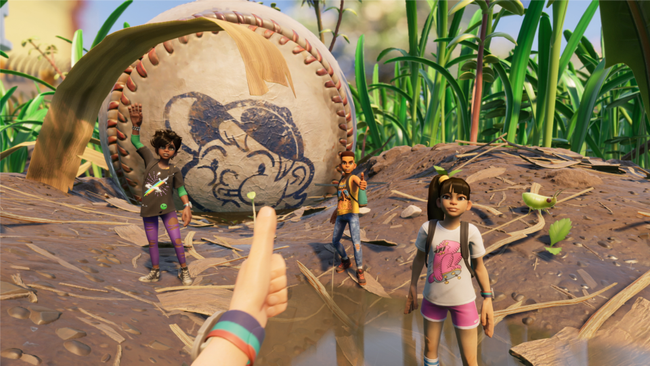
There are four playable characters to choose from who each have a unique personality -- each of which will interact in a bespoke written story in different ways. While designing Grounded, Obsidian had a clear goal of branching out to the survival genre without losing what the studio has become known for. "We've looked at a ton of games like The Forest and Subnautica as a team and tried to incorporate our favorite aspects of each while making sure our Obsidian DNA was there too." Roby disclosed that the four playable player character personalities have been decided on before their playstyle or other factors where differentiated, a tack that another studio might not have taken the same way.
As for the cooperative experience, "We're still working on the specifics on how the online portion is going to work, but we're definitely going to try make sure that Steam and Microsoft Store will be able to play together, but still working on the infrastructure on what that would take to get the same with the console version." Roby made it very clear that having a shared playerbase was a priority for the team but not something that could be outright guaranteed.
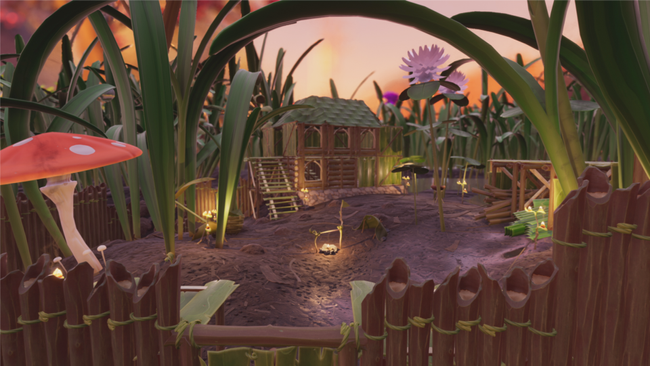
As an early access title, Roby referred back to the pre-release experience from Pillars of Eternity as precedent for following a similar path with Grounded. "Most of the team came from Pillars II, which was community involved pretty early on. Their feedback was instrumental, and we wanted to keep that sort of relationship, so early access seemed to fit that sort of model very well, and it's also something other survival games have had success with." The Forest, which spent four years in Steam's early access program, was mentioned multiple times as an inspiration for Grounded -- and a similar release path is also true for survival titles such as Ark: Survival Evolved, Subnautica, and Rust.
Roby also expressed interest in adding layers to the experience throughout the early access window. "We plan on having a regular cadence of content and feature updates, ranging from new creatures to new equipment and buildings. We want our players to always come back and have something new to enjoy." As for the duration and scope of the early access period and possible new features that could come out of it, Obsidian isn't boxing themselves into any concrete details at this time. "We're gonna see what the community comes back to us with, what their reactions are, and hopefully we can build both all of the things we want to do along with the feedback of what the community wants to see."
As a fan of RPGs (obviously), we're a bit surprised and intrigued by the new direction here, it's not what we would have typically envisioned from the studio a year removed from The Outer Worlds. It'll be interesting to see if Obsidian can penetrate into an arguably more niche genre and establish an audience for their experimental new game.
Grounded will be available via Steam Early Access and Xbox Game Preview in Spring of 2020, as well as on Xbox Game Pass for Xbox One and PC. You can read the announcement details here.
Accommodations for the studio visit were paid for by Microsoft.